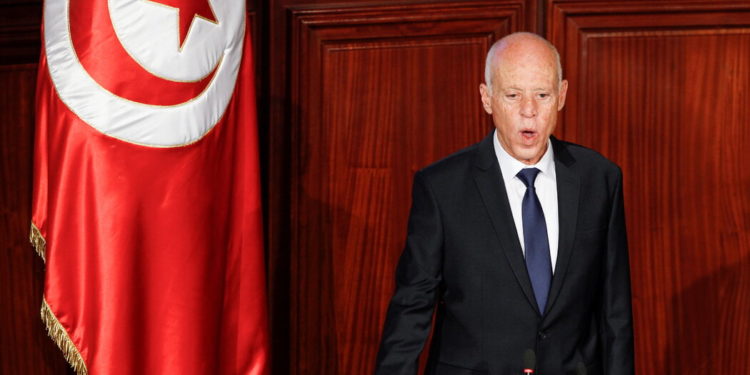Tunisia’s president fired the prime minister, suspended Parliament and took control of the country late on Sunday after large and violent anti-government protests across a nation struggling with deepening health and economic crises.
The moves by the president, Kais Saied, were seen as threat to the only democracy to emerge from the Arab Spring protests a decade ago. A leading political party, Ennahda, called it “a coup against the Tunisian democracy and its constitution” and “a betrayal of every Tunisian,” urging Mr. Saied to reverse his decisions immediately.
“Tunisia is the only Arab Spring’s success story and that story does not end here,” Ennahda said in a statement. “We call on every international supporter of democracy to come together to speak out immediately against this injustice and call for the immediate restoration of our Parliament.”
The North African nation has been in political extremis for months as Mr. Saied faced off in a power struggle with Prime Minister Hichem Mechichi and the speaker of Parliament, Riad Gannouchi. The country has suffered for years from high unemployment, poverty and economic paralysis that led many to question the gains of the revolution, and the coronavirus pandemic has recently overwhelmed the health system, with Tunisians dying of Covid-19 at the highest rate in the Middle East and Africa.
In one move last week that raised alarm for what opponents said was an overstepping of his authority, Mr. Saied handed control of Tunisia’s coronavirus response to the military amid chaos in the vaccination rollout efforts and in hospitals.
The president announced in a statement broadcast on state media and posted to Facebook that he would dismiss Mr. Mechichi, assume executive power with the “help” of a new government appointed by him, “freeze” Parliament for 30 days and strip the immunity of lawmakers. He said he was doing this to preserve the country’s “security and independence and to protect the normal operation of state institutions.”
Mr. Saied’s actions came after large protests across the country on Sunday in which Tunisians called for the dissolution of Parliament. Videos posted to social media showed crowds cheering, honking, ululating and waving Tunisian flags after the president announced Mr. Mechichi’s dismissal late on Sunday night, the dark night lit up by red flares.
Other videos showed Mr. Saied making his way through a dense crowd of cheering supporters along Habib Bourguiba Avenue, the main thoroughfare of the capital, Tunis, where revolutionaries gathered during the 2011 protests that toppled its then dictator, Zine el-Abidine Ben Ali.
The next step for Tunisia is unclear.
In his statement, Mr. Saied said cryptically that “a decree will be issued in the coming hours regulating these exceptional measures that the circumstances have dictated,” adding that the measures “will be lifted when those circumstances change.”
When Mr. Saied was elected in 2019 as an outsider to politics in what was the second free presidential vote in the country’s history, many Tunisians hoped he could turn things around. He still enjoys strong popularity and a reputation for incorruptibility among many in the country.
But after appointing Mr. Mechichi as prime minister last year, Mr. Saied later refused to swear in 11 ministers associated with the new head of government, leading to accusations that he was going beyond his constitutional powers.
Mr. Mechichi was backed by Mr. Gannouchi’s Ennahda party, which has consistently attracted support in parliamentary elections but whose strength has proved divisive because of its Islamist background.
Tunisia’s 2014 Constitution splits executive power between the president, the prime minister and the speaker of Parliament.
But Mr. Saied cited Article 80 of the Constitution, which he said permits the president exceptional powers, and said he had consulted both Mr. Mechichi and Mr. Gannouchi and held an emergency meeting with other officials before acting.
Article 80, however, accords the president such powers only if there is an imminent threat. And Mr. Gannouchi denied being consulted on Sunday in a statement on Ennahda’s Facebook page.
Mr. Gannouchi also decried what he called a “coup” and called the suspension of Parliament “unconstitutional, illegal and invalid.” The assembly “remains in place and will fulfill its duty,” he added.







